16 Hacks For Cleaning Your Oven And Keeping It Spotless
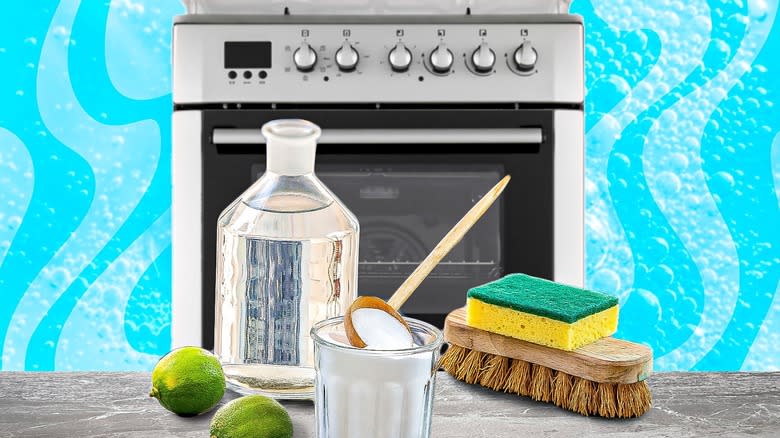
When was the last time you cleaned your oven? If this question has you looking off into space, trying to recall if you ever have actually cleaned your oven or just popped it on the convenient "self-clean" and walked away, then this wake-up call is for you. Cleaning your oven regularly is not only a part of maintaining a clean kitchen, but it also can cause a potential safety risk if burnt-on food ignites or cross-contaminated surfaces make you sick.
To be frank, cleaning isn't one of our favorite things in the world. While we love having a clean space, the process of getting to that clean, organized state is nothing short of a challenge. To help out the weary cleaners among us, we've collected some of the best tips and tricks for cleaning your oven. The best part is that you won't have to go out and buy a special oven cleaner, instead, most of these cleaning tips can be done with tools and ingredients already in your home.
Read more: 30 Popular Frozen Pizzas, Ranked Worst To Best
Use A Dishwasher Tab To Clean Off Your Oven Doors
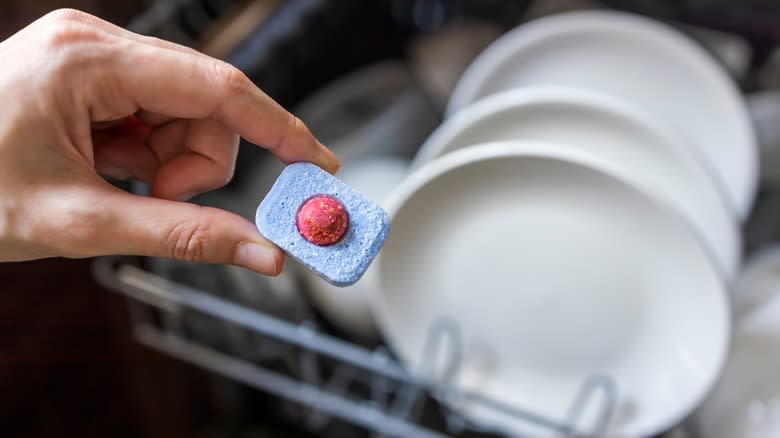
Dirty oven doors are an obvious sign that you must dedicate time to cleaning your oven. But with a dishwasher tab, you can leave your oven doors spotless with ease. These tablets are made with enzymes and surfactants that help break down proteins, while the surfactants help spread out the cleaning product across more space. The result is an even clean that you can hold and apply with your hand. In addition, dishwasher tablets pose less threats to human health than conventional oven cleaners.
You should always use rubber gloves when applying the dishwasher tablet to your oven doors since the chemicals inside the tablet can be pretty powerful. Dip the tablet in warm water so it's sticky before rubbing it gently on the glass window and non-glass surfaces. You may have to dip the tablet in multiple times to spread the cleaning agent, but you don't want it so wet that it disintegrates or falls out of your fingertips. Then, wipe off the door with a dry cloth to remove the particles before swiping with a damp cloth to remove the soapy residue.
Make The Most Of Your Space And Use A Bathtub To Clean Oven Racks
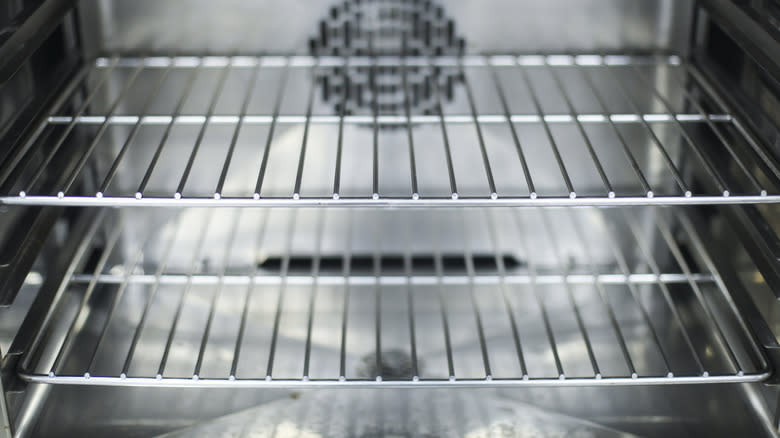
Oven racks can be obtrusive to move around, especially when it comes time to wash them. This TikTok hack will help you effortlessly clean oven racks, but you may have to venture out of your kitchen to do so. First, pull the oven racks from the oven and transfer them to your bathtub. Fill the tub with hot water, enough to submerge the racks, and add three dishwasher tablets to the tub. The key to this hack is letting your racks soak for about three hours before removing and drying the racks.
There's no scrubbing needed for this hack, and the hardest part is cleaning the specks of caked-on food out of your bathtub before you need to shower. Other users have also suggested putting the racks in a tub with dryer sheets and dishwasher tablets before wiping them off and returning them to the oven.
Use Paper Towels To Help Oven Cleaner Stick
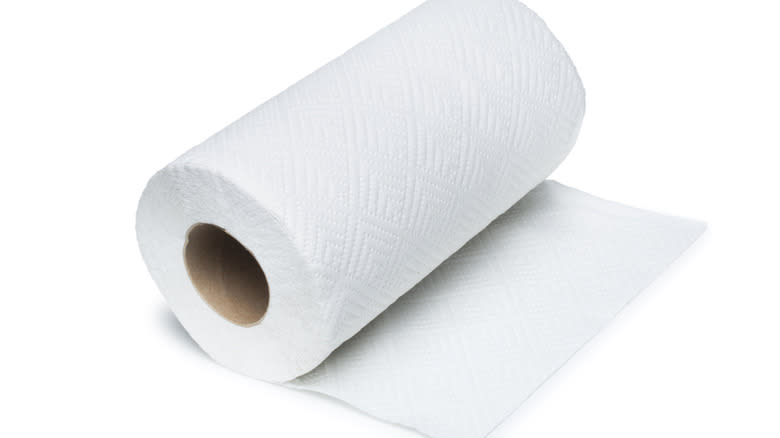
One of the biggest challenges with cleaning your oven is getting the cleaner to stick to the walls long enough to remove the grease. This paper towel hack changes the oven-cleaning game because it allows the cleaner to effectively stick, and it only requires a bit of elbow grease to remove pesky pieces of stuck-on food.
Start by removing the racks in your oven. Then, spray the walls of the oven with a non-toxic degreaser or a cheaper alternative, like dish soap. Then, stick your sheets of paper towel to the sides and bottom of the oven before adding another spray to hold the towels in place. In a couple of hours, you can remove the plastered paper towels from the oven and wipe off any pieces of food or mounds of grease with a clean towel. Since these paper towels are highly flammable, it's always important to do a second check of the oven to make sure it's turned off, and that you got every single piece.
Apply Vinegar To Clean Oven Knobs
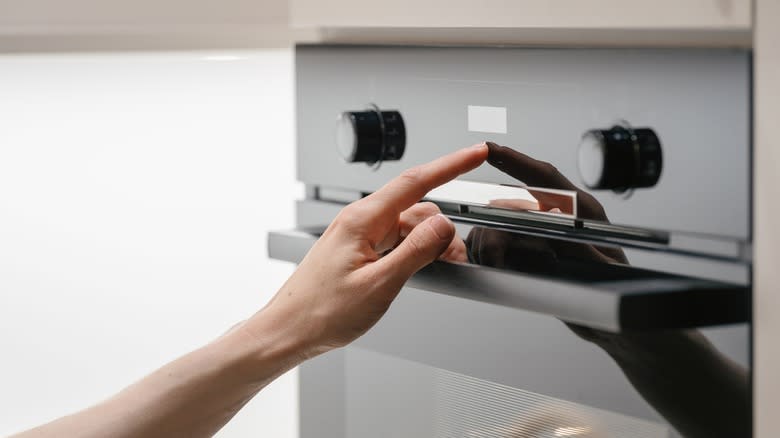
If your kitchen is anything like ours, there are a lot of batter-caked hands touching oven knobs and kitchen surfaces. To clean grubby oven knobs and make them shine, try using a standard distilled white vinegar, along with a pinch of elbow grease. For the best clean, you'll need to focus not only on the knobs but also the place where they connect to the oven. If you can remove the knobs, put them in a bowl of distilled white vinegar and allow them to sit for about five minutes. Then, spray the connections with distilled white vinegar and wipe them with a clean cloth. Before attaching the knobs back to their rightful place, you'll want to give them a quick rinse with dish soap and water to remove the vinegar residue.
Knobs are just as important to clean as the rest of your oven, especially considering they can be a breeding ground for germs and bacteria. We recommend washing them at least every few weeks or wiping them down after everyday use.
Make Oven Cleaning A Regular Occurrence

The key to making any task easier is to break it down into smaller tasks. Rather than having to deal with an oven that looks like it's never been cleaned, schedule regular cleanings in advance to make sure you don't forget about regular upkeep. The exact question of how often you should clean your oven depends on how often you use it. Overall, you should be cleaning your oven more often than you think.
For a couple of dinners a week, you should plan to do a deep clean of your oven (meaning, not just a "wipe the knobs down and Windex the front window") every three months to conquer buildup and prevent any unanticipated smoking from leftover burnt pie crust. You should also plan to give the interior of your oven a quick wipe down with a clean cloth every two to three uses.
Don't Rely On The Self-Clean Feature Of Your Oven
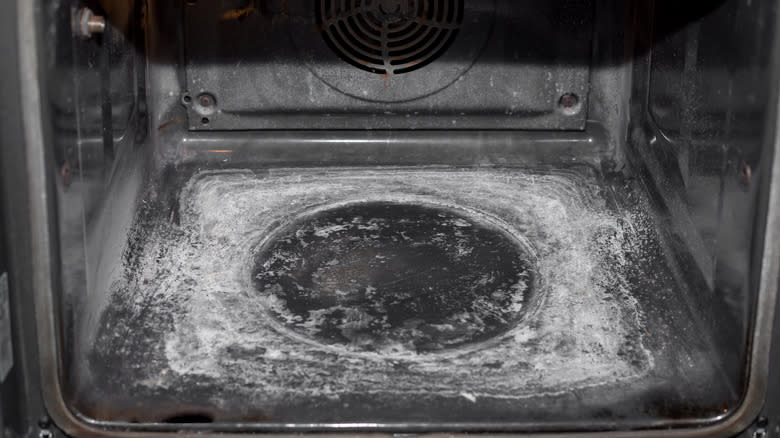
Your oven's self-cleaning function can be both a blessing and a curse. Once turned on, the self-clean button on your oven jacks up the inside heat to close to 900F to burn or steam off any residual food residue. But this function can take anywhere from two to five hours to complete, and your oven must be locked and out of commission for that period. Plus, the heat creates a pile of ash on the bottom of your oven and dangerous fumes like carbon monoxide to leach out into your home.
That's not to say that you can't use the self-clean function occasionally, but it shouldn't be your only cleaning method. You should also take precautions when self-cleaning your oven, like turning on the exhaust fan and keeping pets and children out of the kitchen while the cycle is running.
Use Aluminum Foil To Clean The Gunk Off Your Oven Racks
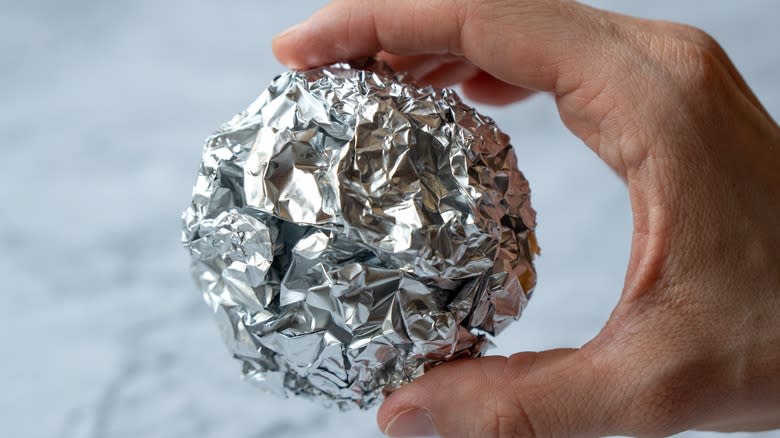
The secret to cleaning your oven rack is already in the kitchen. Just grab a wadded-up ball of aluminum foil and you'll be set to get to work. Seriously, it's that easy!
There are two ways to use this handy piece of metal to clean stuck-on food from your racks. You can rub it against the racks after they have soaked in warm water. The nooks and crannies of the ball will help dislodge any food, along with a helping hand from a squirt of dish soap. You can also wrap the racks in foil and submerge them in water with a detergent pod. The chemical reaction between the detergent and the metal will help the food come off more easily. Then, you can crumble the foil and scrub off any residual build-up from the racks before returning them to the oven.
Only Clean Your Oven Once It's Cooled
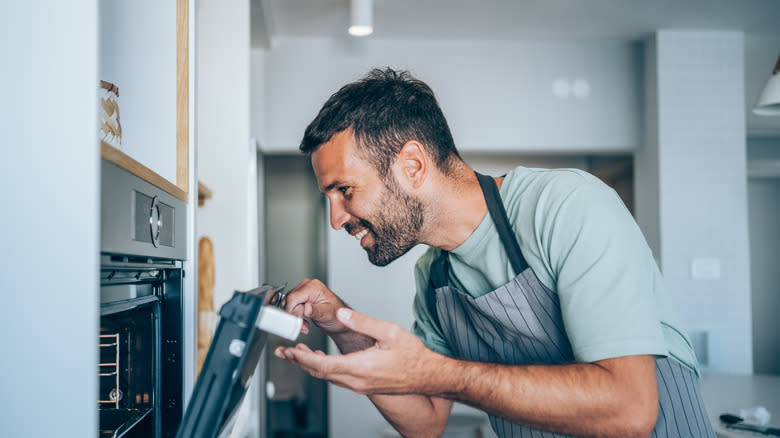
Some things are easier to clean while they're still warm. Your oven is not one of them. It can be dangerous to clean a warm oven because the chemical cleaners can potentially cause a reaction and release noxious vapors into your kitchen. There is also the potential to spark a fire hazard if your oven is even slightly warm before you start scrubbing. In addition, hitting a hot heating element can cause damage to the oven or send flames flying.
To ensure your oven is completely cool and safe to clean, we recommend disconnecting it from the electric or gas source to prevent any sparks. Meanwhile, always wait a few hours until your oven has completely cooled down before cleaning it. To expedite this process, try cracking your oven open to allow the heat to escape after you've finished using it.
Apply Salt Immediately After Your Food Spills
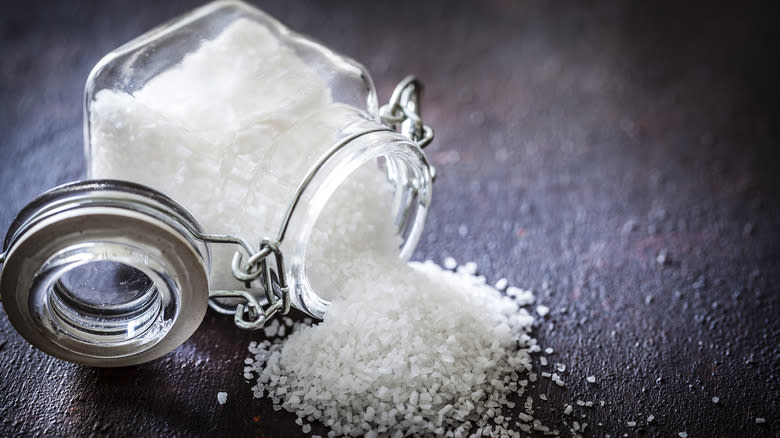
Salt is a staple for a well-seasoned steak or bringing a bit of unexpected savoriness to a cookie. But did you know it's also the secret ingredient that makes cleaning your oven easier?
This ingredient is the first line of defense from a spill in your oven. Since you can't spray chemicals or wipe down the spill with a cloth without the potential for burns, you should turn to salt to help soak up any juices or drippings onto the inside of your oven. Just add a sprinkle of salt as soon as you notice a drip and make cleaning easier once your oven has cooled down.
This hack works because salt is abrasive and highly absorbent. It will prevent the juice from sticking to the bottom of the oven and will keep it contained in a small pile so you can easily wipe it up with a DIY cleaning solution or towel once the oven has been turned off.
Grab A Vacuum To Clean Stubborn Corners
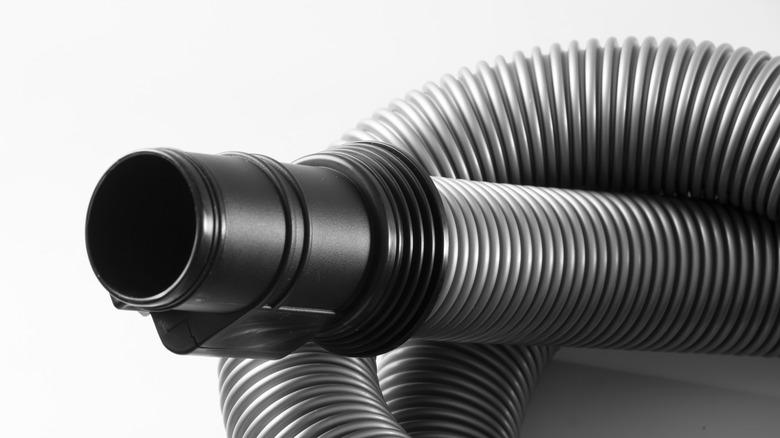
Reaching into the back corners of your oven to grab a piece of squash that managed to fall off the tray is harder than you'd think. The perfect first step when cleaning your oven is always to grab your vacuum and suction out any residual debris. You'll want first to make sure the oven is off and the racks have been removed from the appliance. Then, you can use a wallpaper scraper or spatula wrapped in a kitchen towel to prevent scraping the interior to remove any caked-on dirt from the side of your oven.
After your debris has been peeled, use a handheld vacuum or a hose to suck up the pieces. This home hack also works well for getting pieces of food from the hinges of your oven and the space between the heating element. You can also use the tool to help clean behind or underneath your oven, where dust bunnies tend to hide.
Utilize A Toothbrush To Apply Your Oven-Cleaning Paste
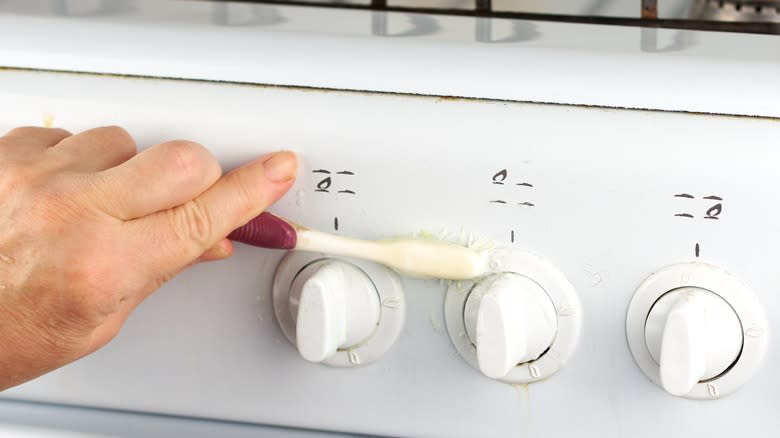
A toothbrush is a great tool to use when you can't quite scrub all the far reaches of your oven. It's the bathroom staple that'll make cleaning your oven so much easier, and it's a great way to use an old toothbrush that would otherwise be thrown away. The bristles will scrub off any grime on the racks of your oven, vents, or knobs without damaging the enamel surfaces.
The key to this hack is first to apply a layer of oven-cleaning "toothpaste," like a natural oven cleaner made with baking soda and a little bit of acid like lemon juice or vinegar. Keep a small container of this paste near your oven so you can dip and scrub all the little nooks in your oven. After the scrubbing is complete and the cleaner has had time to do its magic, you can wipe off the cleaning product with a clean towel.
Grab Lemons To Help Keep Your Kitchen Clean And Smelling Amazing
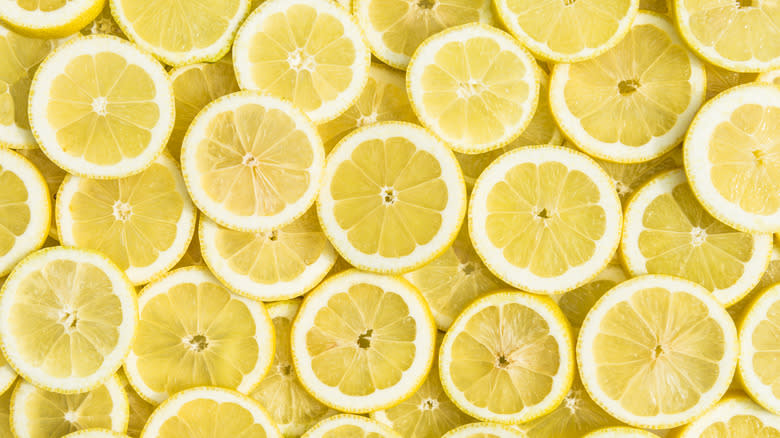
What's not to love about lemons? Especially when you can use them for a cool summer lemonade or an ingredient in your margarita. But did you know you can also clean your oven with a bowl of lemon water? All you have to do is slice up your citrus and add it to an oven-safe bowl or baking dish with some water. Bake the mixture for about an hour at 350F to allow the grease to loosen before you cool down the oven and wipe away the grime with a kitchen towel.
The primary reason why lemons are a fantastic cleaning ingredient is because the fruit contains citric acid. This substance has antibacterial properties, meaning it can rid your kitchen surfaces of E. coli and salmonella. Plus, the compound will loosen grime while also leaving your kitchen smelling amazing. Besides leaving the lemon water in your oven, you can also dip into the leftovers with a sponge and wipe down your kitchen surfaces and the inside of your oven.
Use A Drip Pan To Minimize Grime
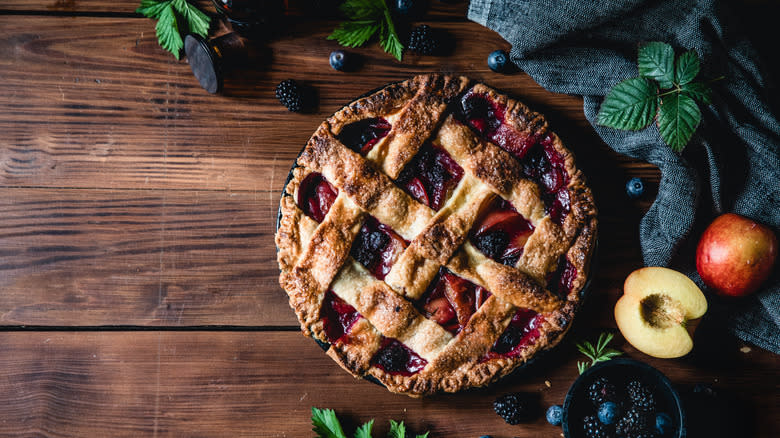
Have you ever placed a blueberry or cherry pie into the oven knowing that it was going to likely drip over the edges? Or placed a lasagna pan on the rack, thinking about how you may have filled it just a little bit too much? Hindsight is always 20/20, but the best thing you can do to clean up potential oven messes like these is to prevent the mess from happening in the first place. You can use a drip pan — which can just be a rimmed sheet pan — to prevent juices from dribbling down onto your heating element. Alternatively, you can also purchase a heat-resistant oven liner to ensure your oven stays clean for as long as possible.
This hack doesn't just keep your oven clean, but it also keeps your family safe. It is dangerous to let food drip in the oven because it can cause a fire.
Make A DIY Steam Cleaner
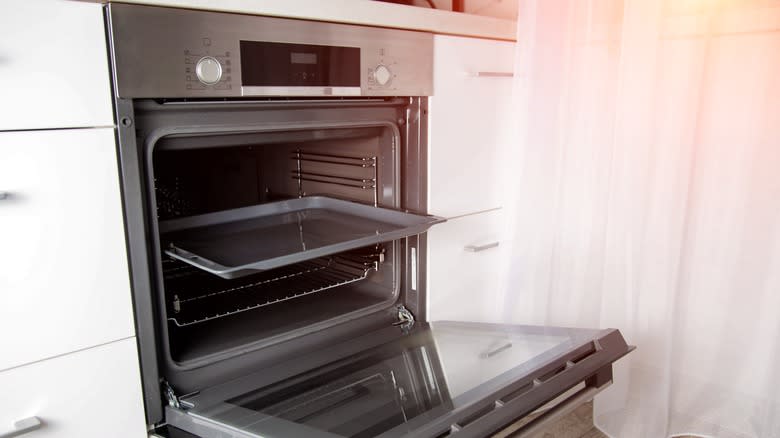
Some folks are lucky enough to have a steam-cleaning function on their oven. Others? Not so much. If you don't want to clean your oven using chemicals, you can turn to a DIY steam cleaner to help release some of that caked-on grit and grime from everywhere in your oven. Start by placing an oven-safe container of water in your oven and heating it to 450 F. The exact time needed will depend on how gross your oven is. A mostly clean oven may take only 20 minutes, while an hour might be necessary for a particularly gross oven.
Water alone may not be the best way to tackle kitchen grime. You can also add a couple of splashes of vinegar to the container before you set it in the oven or pull out your container of lemon juice to help fight tough grease. Once the oven is cooled, run a clean cloth over the condensation to remove the rehydrated grit.
Avoid Noxious Chemicals
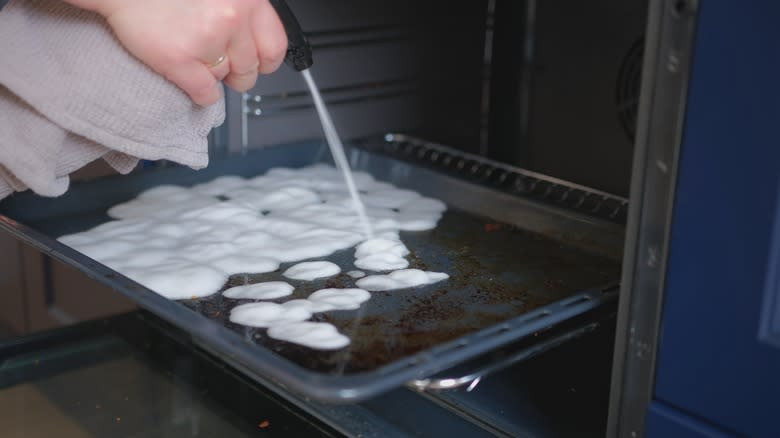
One of the biggest mistakes people make when cleaning their oven is purchasing noxious oven cleaning chemicals from their store. These conventional cleaners break down grease and food residue over a period of time before they can be wiped up and thrown out. Although these cleaners have a high efficacy, there are numerous potential safety risks from working with them, compared to a non-toxic cleaner made from baking soda and vinegar.
Oven cleaners are often caustic (meaning very alkaline) and can cause burns or irritation if they get on your skin. Since these chemicals are often sprayed on, there is also the potential for the compounds to go airborne and cause irritation in the eyes, mouth, or throat, which can cause severe burns, worsen conditions like asthma, and even cause blindness. Non-toxic, DIY mixtures are often cheaper to make at home and don't pose the same health risks.
Remove Caked On Grease From The Door With A DIY Cleaning Solution
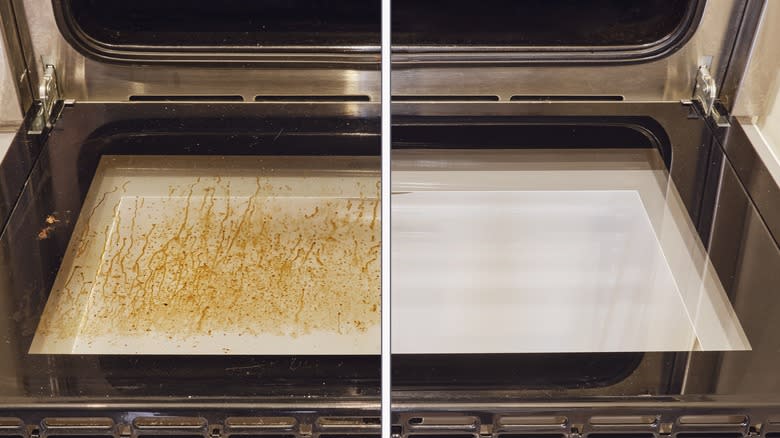
What's the issue with a dirty window? While it might just seem like a nuisance to clean, a dirty window prevents you from keeping an eye on your cakes, roasts, and food as it cooks. The easy way to ensure that your oven door stays clean is to whip up a DIY mixture of baking soda, distilled white vinegar, and water. This powerful paste will help you easily remove baked-on grease from your oven's glass door and leave your oven looking perfectly shiny.
First, apply a paste of baking soda and water to the oven door and allow it to sit for about ten minutes. This will dissolve the grit, while the mixture of one part vinegar to four parts water applied afterward will lift the grease and allow you to remove it with a microfiber cloth. You won't have to worry about scratching the oven door, and you'll get to enjoy a clear picture of whatever delicious is cooking in your oven next.
Read the original article on Tasting Table.

